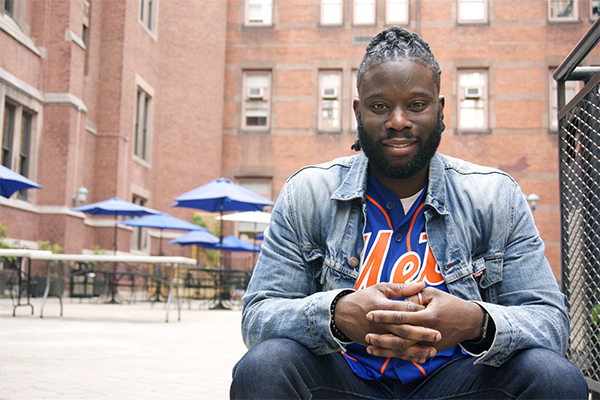Act II: Helping Others: Mack Exilus (M.A. Counseling Psychology)

“African-American adolescents face a great deal of adversity yet are currently underserved by mental health care,” says Mack Exilus, who graduated on May 17 with a master’s degree in Counseling & Clinical Psychology.
Exilus speaks from firsthand experience. After emigrating from Haiti, his parents struggled to get a foothold in America. His father drove a cab, his mother worked as a home health aide, and Exilus also worked many low-paying jobs to help the family make ends meet. Then, when he was 25, his mother died, a wrenching ordeal that he credits therapy with helping him survive. The experience helped him understand the stigma that much of the African American community attaches to seeking mental health care. Most African Americans of all ages don’t seek mental health services, he says, so their depression frequently goes undiagnosed and untreated. And even when they do seek mental health treatment, they attend fewer sessions and are more likely than white patients to end treatment prematurely.
“African Americans suffer more psychological distress because of their experiences with racism, discrimination, prejudice, poverty, and violence and many have fewer psychological and financial resources for coping with these stresses,” Exilus says. “These are key factors in my wanting to help adolescent.”
He brings an interesting resume to that calling, including studying theater at LaGuardia Community College; working as a teaching artist for ENACT, a nonprofit that uses actors to dramatize the emotional problems facing students in city schools; and managing a retail store called the New York Running Company. He was working at the latter when one day Alison Desir (M.A. ’16), founder of Harlem Run, a collective of runners passionate about running and community, stopped in to buy shoes. The two became friendly, and Desir went to see Exilus perform.
“I was truly moved by his raw talent and dynamism,” Desir says,” and I have had the opportunity to hear Mr. Exilus speak passionately about the way in which he sees theater as a vehicle to connect with inner-city youth and allow them a safe space to be emotionally present and vulnerable.”
Desir encouraged Exilus to apply to TC. She even wrote him a letter of reference. He was stunned – and delighted – when he got in.
One highlight of his TC education, Exilus says, was doing an internship at Rikers Island. He counseled young men who were awaiting sentencing, a kind of anguished purgatory that made confinement even more stressful.
“The saddest part of the work for me was seeing that some of the men had no homes, nowhere and no one to return to after prison,” says Exilus, “whereas other men had children but couldn’t see them. Most of the men were Hispanic or African American, so I talked with them about race.
“We should try our best as mental health clinicians to re-frame and reclaim what therapy means to the populations we serve,” he says. “I’d like to service adolescents blacks since they don’t right now receive the psychological counseling they need and deserve. And I want to work with young people because I love helping them and they are, after all, our future.” – Robert Florida
Published Tuesday, May 30, 2017